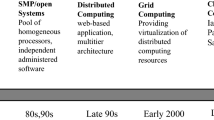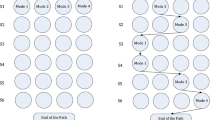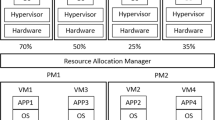Abstract
With the coming shift to cloud computing, cloud database is emerging to provide database service over the Internet. In the cloud-based environment, data are distributed at Internet scale and the system needs to handle a huge number of user queries simultaneously without delay. How data are distributed among the servers has a crucial impact on the query load distribution and the system response time. In this paper, we propose a market-based control method, called MBA, to achieve query load balance via reasonable data distribution. In MBA, database nodes are treated as traders in a market, and certain market rules are used to intelligently decide data allocation and migration. We built a prototype system and conducted extensive experiments. Experimental results show that the MBA method significantly improves system performance in terms of average query response time and fairness.
Similar content being viewed by others
References
IBM software strategy group. IBM Google Announcement on Internet-Scale Computing (Cloud Computing Model), 2007
Niu J, Cai K, Gerding E, et al. Characterizing effective auction mechanisms: insights from the 2007 tac market design competition. In: Proceedings of the 7th International Conference on Autonomous Agents and Multiagent Systems, Estoril, 2008
Zhang Y, Kameda H, Hung S L. Comparison of dynamic and static load-balancing strategies in heterogeneous distributed systems. Comput Digit Tech, 1997, 144: 100–106
Lin H C, Raghavendra C S. A dynamic load-balancing policy with a central job dispatcher (LBC). IEEE Trans Softw Engineer, 1992, 18: 148–158
Narendran B, Rangarajan S, Yajnik S. Data distribution algorithms for load balanced fault-tolerant web access. In: Proceedings of the 16th Symposium on Reliable Distributed Systems, North Carolina, 1997. 97–106
Chen L C, Choi H A. Approximation algorithms for data distribution with load balancing of web servers. In: Proceedings of IEEE International Conference on Cluster Computing, California, 2001. 274–281
Tse S S. Approximate algorithms for document placement in distributed web servers. IEEE Trans Softw Engineer, 2005, 16: 489–496
Yokota H, Kanemasa Y, Miyazaki J. Fat-Btree: An update-conscious parallel directory structure. In: Proceedings of the 15th International Conference on Data Engineering, Sydney, 1999. 448–457
Lee M L, Kitsuregawa M, Ooi B C, et al. Towards self-tuning data placement in parallel database systems. In: Proceedings of SIGMOD Conference, Texas, 2000. 225–236
Feelifl H, Kitsuregawa M, Ooi B C. A fast convergence technique for online heat-balancing of Btree indexed database over shared-nothing parallel systems. In: Proceedings of the 11th International Conference on Database and Expert Systems Applications, London, 2000. 846–858
Watanabe A, Yokota H. Adaptive lapped declustering: A highly available data-placement method balancing access load and space utilization. In: Proceedings of the 21st International Conference on Data Engineering, Tokyo, 2005. 828–839
Friedman D. The double auction institution: A survey. In: The Double Auction Market: Institutions, Theories and Evidence. Boulder: Westview Press, 1993. 3–25
Nicolaisen J, Petrov V, Tesfatsion L. Market power and efficiency in a computational electricity market with discriminatory double-auction pricing. IEEE Trans Evol Comput, 2001, 5: 504–523
Tesauro G, Kephart J O. Pricing in agent economies using multi-agent Q-learning. Auton Agents Multi-Agent Syst, 2002, 5: 289–304
Gode D K, Sunder S. Allocative efficiency of markets with zero intelligence traders: Market as a partial substitute for individual rationality. J Political Econ, 1991, 101: 119–137
Cliff D, Bruten J. Less than human: Simple adaptive trading agents for CDA markets. Technical Report HP-97-155. 1997
Jain R. The Art of Computer Systems Performance Analysis: Techniques for Experimental Design, Measurement, Simulation, and Modeling. New York: Wiley-Interscience, 1991
Wang T J, Yang B S, Gao J, et al. Effective data distribution and reallocation strategies for fast query response in distributed query-intensive data environments. In: Proceedings of APWeb, Shenyang, 2008. 548–559
Author information
Authors and Affiliations
Corresponding author
Rights and permissions
About this article
Cite this article
Wang, T., Lin, Z., Yang, B. et al. MBA: A market-based approach to data allocation and dynamic migration for cloud database. Sci. China Inf. Sci. 55, 1935–1948 (2012). https://doi.org/10.1007/s11432-011-4432-3
Received:
Accepted:
Published:
Issue Date:
DOI: https://doi.org/10.1007/s11432-011-4432-3




